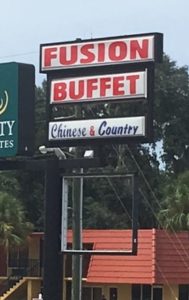 While driving through Taylor County in North Central Florida, my eyes were drawn to a large sign advertising a “Fusion Buffet”, which struck me at first as a little progressive for this rural area. It shared a pedestal with a sign for a motel, and beneath the headline of the sign were smaller words that revealed the unique combination entailed in this fusion fare: “Chinese & Country.” Only in America, I muttered to myself, even as my imagination conjured what one-of-a-kind dishes the buffet might serve. I would definitely have stopped if I hadn’t just eaten at a BBQ joint up the road. Still, the thought of it made me smile all the way back home to Jacksonville.
While driving through Taylor County in North Central Florida, my eyes were drawn to a large sign advertising a “Fusion Buffet”, which struck me at first as a little progressive for this rural area. It shared a pedestal with a sign for a motel, and beneath the headline of the sign were smaller words that revealed the unique combination entailed in this fusion fare: “Chinese & Country.” Only in America, I muttered to myself, even as my imagination conjured what one-of-a-kind dishes the buffet might serve. I would definitely have stopped if I hadn’t just eaten at a BBQ joint up the road. Still, the thought of it made me smile all the way back home to Jacksonville.
America is inherently a melting pot where racial and cultural “worlds” sometimes collide, but more often fuse, as loudly proclaimed in the sign for the intriguing buffet. Whatever persecution, oppression, or longing for opportunity first brought us or our respective ancestors to this place, we are all here now, and part of a national and cultural tapestry unlike any other. I can’t understand why some people feel threatened by this rich diversity. It seems to me to bring a flavor to life here that is worthy of celebration. It makes me smile.
Every Tribe, Nation & Tongue
The church, or “body” of Christ, is even more diverse according to the Bible, comprised of people from every tribe, nation and tongue (Revelation 7:9-10). I’ve experienced this in a small way in my travels, celebrating Communion with fellow believers in India, Haiti, Mexico and the Philippines. And one of the radical and liberating features of the Gospel is that “[t]here is neither Jew nor Gentile, neither slave nor free, nor is there male and female, for you are all one in Christ Jesus” (Galatians 3:28). Think about that! The common categories that we tend to use to divide ourselves— race, ethnicity, socioeconomic status and gender— are all obliterated in Christ. In spite of our differences, we are one.
Understanding Unity
I think we sometimes misunderstand what “unity” is, succumbing to the idea that it means everyone thinks or even looks alike. To the contrary, unity means that even with our differences, whether in viewpoints, backgrounds, or genetics, we get along and care about each other anyway. We work together for common purposes in service of a cause that is bigger than our individual selves. That’s true in the church and in every aspect of life.
A Greater Cause
The cause isn’t always fundamentally significant, as with a fusion buffet or sports team. Sometimes the cause is far bigger than that, as when citizens address important national challenges that threaten to divide us in America, or wherever else you might live. But sometimes the cause served by people working together in unity is even far, far bigger still, transcending every national, geographic, racial, ethnic, economic, or gender boundary. This greatest Cause is reflected in Jesus’ prayer to his Father the night before he was killed, which was expressly offered for believers everywhere, from his Disciples then until you and me today:
“My prayer is not for them alone. I pray also for those who will believe in me through their message, that all of them may be one, Father, just as you are in me and I am in you. May they also be in us so that the world may believe that you have sent me. I have given them the glory that you gave me, that they may be one as we are one— I in them and you in me—so that they may be brought to complete unity. Then the world will know that you sent me and have loved them even as you have loved me.” (John 17:20-23)
If it were up to us, we Christ-followers might have preferred a different approach by God. But it isn’t, and we must recognize that how we work together and get along—in spite of our differences—really matters.
